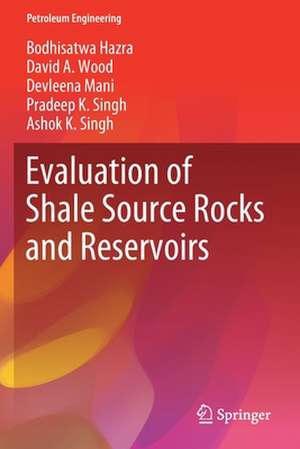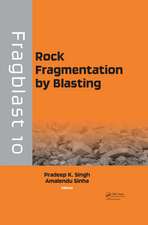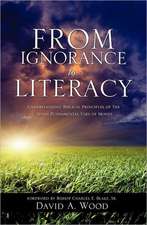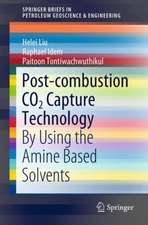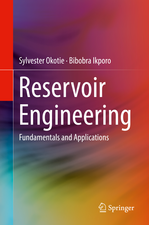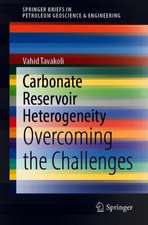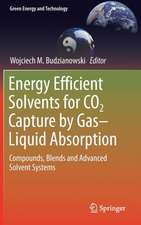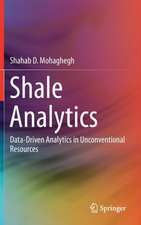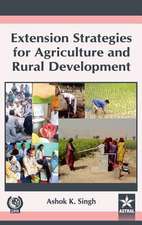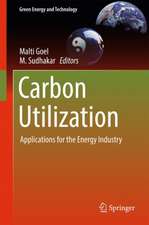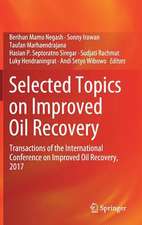Evaluation of Shale Source Rocks and Reservoirs: Petroleum Engineering
Autor Bodhisatwa Hazra, David A. Wood, Devleena Mani, Pradeep K. Singh, Ashok K. Singhen Limba Engleză Paperback – 14 aug 2020
Given its scope, the book will be of interest to all researchers working in the field of source-rock analysis. In addition, the source-rock evaluation techniques – and the various intricacies associated with them – discussed here offer valuable material for postgraduate geology courses.
| Toate formatele și edițiile | Preț | Express |
|---|---|---|
| Paperback (1) | 520.61 lei 6-8 săpt. | |
| Springer International Publishing – 14 aug 2020 | 520.61 lei 6-8 săpt. | |
| Hardback (1) | 696.18 lei 6-8 săpt. | |
| Springer International Publishing – 6 mai 2019 | 696.18 lei 6-8 săpt. |
Preț: 520.61 lei
Preț vechi: 612.49 lei
-15% Nou
Puncte Express: 781
Preț estimativ în valută:
99.63€ • 103.63$ • 82.25£
99.63€ • 103.63$ • 82.25£
Carte tipărită la comandă
Livrare economică 12-26 aprilie
Preluare comenzi: 021 569.72.76
Specificații
ISBN-13: 9783030130442
ISBN-10: 3030130444
Pagini: 142
Ilustrații: XII, 142 p.
Dimensiuni: 155 x 235 mm
Greutate: 0.23 kg
Ediția:1st ed. 2019
Editura: Springer International Publishing
Colecția Springer
Seria Petroleum Engineering
Locul publicării:Cham, Switzerland
ISBN-10: 3030130444
Pagini: 142
Ilustrații: XII, 142 p.
Dimensiuni: 155 x 235 mm
Greutate: 0.23 kg
Ediția:1st ed. 2019
Editura: Springer International Publishing
Colecția Springer
Seria Petroleum Engineering
Locul publicării:Cham, Switzerland
Cuprins
Fundamentals of Shale Rock and Shale Gas: Inorganic Perspective.- Source Rock Assessment.- Perspectives and Conclusions.
Notă biografică
Dr. Bodhisatwa Hazra is currently working as a Scientist at the CSIR- Central Institute of Mining and Fuel Research, Dhanbad, India. His main areas of research interests are Petroleum Geochemistry, Petrophysics, CO2 geological storage, and Organic Petrology. He has expertise in handling Rock-Eval, optical microscope, FE-SEM, high-pressure and low-pressure gas adsorption equipment, TGA-DTA, and X-ray CT. Dr. Hazra received his doctoral degree from the Department of Applied Geology, Indian School of Mines, Dhanbad, for his research work on the shale-gas assessment of Raniganj basin, India. Following his doctoral research, and brief post-doctoral research at IIT Bombay, India, he received the prestigious DST Inspire Faculty award, and served briefly at IIT Kharagpur, India through it. Beyond his immediate areas of research interest, Dr. B. Hazra also has expertise in carbonization, artificial maturation of organic-sedimentary rocks. Beyond reviewing articles for several leading journals, he has also served as a guest editor in the special issue for Advances in Geo-Energy Research (AGER) on Shale Thermal Maturity Issues and Modelling. In his career so far, Dr. Hazra has authored 29 articles in leading international journals and conference proceedings.
Dr. David Wood has more than thirty-five years of broad international oil and gas experience including technical and commercial evaluations and research as part of exploration and production operations around the world. He has conducted source-rock interpretation and thermal-maturity modelling since the early 1980s including the development of practical models to match burial histories and pyrolysis data. This work has expanded in recent years to focus on shales and tight organic-rich rocks as exploitable petroleum systems in their own right. Having worked for several oil and gas companies in the 1980s and 1990s (Phillips petroleum, Amoco, Lundin Oil and Canadian Independents), he has worked as an independent consultant since 1998. As well as providing evaluation, advice and training to international and national oil and gas on a range of technical and commercial issues, his consultancy, DWA Energy Limited, actively participates in research projects. He was a founding editor of the Journal of Natural Gas Science & Engineering (2008 to 2009) and is a former Editor-in-Chief of that journal (2013 to 2016). He is currently the co-Editor-in-Chief of Advances in Geo-Energy Research. Dr Wood attained his PhD from Imperial College, London (U.K.) in 1977 and worked as a Royal-Society post-doctoral research fellow at the Institut de Physique du Globe (Paris, France) and Birmingham University (U.K.) in the late 1970s, prior to being employed by oil and gas industry operators and consultants.
Dr. Devleena Mani Tiwari is a UGC-Assistant Professor at Centre for Earth, Ocean and Atmospheric Sciences, University of Hyderabad, India. She attained her Master’s and PhD degrees from Banaras Hindu University (BHU), Varanasi and CSIR-National Geophysical research Institute (NGRI) - Osmania University, Hyderabad, respectively. Her research focuses on the origin, properties and fate of sedimentary organic matter of both recent and deep geological time scales. She studies paleo and depositional environments of organic matter, biomarkers and stable isotopes in energy and environment, thermal and burial history of petroleum source rocks, kinetics of kerogen cracking, geochemical basin modelling and evaluation of hydrocarbon and shale gas systems. She also works on the development and application of analytical methods for geological materials using stable isotope and organic mass spectrometry. Dr. Mani has published 40 research papers in leading peer reviewed journals and books and recently co-edited a book on “Shale Gas: Exploration and Environmental and Economic Impacts” for Elsevier. She has contributed to more than 25 projects on conventional andunconventional hydrocarbon exploration in Indian sedimentary basins for various oil and gas industries. Dr. Mani is a reviewer for several leading journals and scientific projects from government and private funding agencies and also serves as an editorial board member of several journals.
Dr. Pradeep Kumar Singh is currently the Director of CSIR- Central Institute of Mining and Fuel Research, Dhanbad, India. His main areas of research interests are Rock Mechanics and Mining Methods in general and Rock Excavation Technologies in particular. Dr. Singh received his doctoral degree from the prestigious Institute of Mining Engineering, Technical University Clausthal, Germany, for his research work on ground vibrations due to rock blasting. He also worked as a post-doctoral research fellow at the Lassonde Institute of Geosciences, University of Toronto, Canada. Apart from authoring more than 150 articles in international journals and conference proceedings, Dr. Singh has authored/edited four books. He has been the recipient of several prestigious awards and has served as an Invited Faculty Member, Technical University, Bergakademie, Freiberg,Germany. Beyond his immediate areas of research interests, Dr. Singh also has expertise in quality monitoring and utilization of coal. He is a member of several prestigious international and national research bodies, and is currently the Chairman of the Bureau of Indian Standards (BIS) Committee on Solid Mineral Fuels Sectional Committee. Further, Dr. Singh is also currently the Nodal Theme Director, Energy (Conventional & Non-conventional) and Energy Devices, CSIR, New Delhi, India.
Dr. Ashok Kumar Singh has over 25 years of broad experience in the field of Coal Geology, including petrographic and chemical characterisation of Indian, Indonesian and Australian coals for carbonization, combustion, gasification and Coal Bed Methane industries. He has done pioneering work in the area ofbasic and industrial research on Indian natural cokes (Jhama) and mine fire-related problems in Indian industries. Dr. Singh earned his PhD in Coal Petrology from Banaras Hindu University, India, and is currently working as senior Principal Scientist and heading two research groups (Resource Quality Assessment & Environmental Research Group) at the prestigious national laboratory CSIR-Central Institute of Mining and Fuel Research, Government of India. He is leading several projects of national importance on the quality of Indian coals for power plants covering almost the entire coal and power sector, and contributes a major share of external income to his Ministry. He is member of ISO and BIS committees and has published over 90 papers in reputed journals, seminars and symposia in addition to editing books and several chapters. He is a reviewer for various journals including Fuel, International Journal of Coal Geology, Clay Research and many others. He has organised many seminars and symposia including–COAL 2003, GLOBAL COAL 2005, ICCP (International Committee for Coal and organic Petrology-ICCP 2014) in the year 2014, NexGen 2017. In the year 2019 he is Organising Secretary of ENCO-2019 (International Conference on Energy and Environment at Vigyan Bhavan, New Delhi during 20-22 February 2019 and for the year 2022 again ICCP meeting and symposia at New Delhi. Dr. Singh has also won several awards including National Technology Award 2017 from Ministry of Science & Technology, New Delhi and MGMI Coal Scientist Award for the year 2018.
Textul de pe ultima copertă
This book details the analytical processes, and interpretation of the resulting data, needed in order to achieve a comprehensive source-rock evaluation of organic-rich shales. The authors employ case studies on Permian and Cretaceous shales from various Indian basins and other petroleum-bearing basins around the world to illustrate the key features of their organic-rich shale characterization methodology. These case studies may also help to identify potential zones within shale formations that could be exploited for commercial gas and/or oil production.
Given its scope, the book will be of interest to all researchers working in the field of source-rock analysis. In addition, the source-rock evaluation techniques – and the various intricacies associated with them – discussed here offer valuable material for postgraduate geology courses.
Given its scope, the book will be of interest to all researchers working in the field of source-rock analysis. In addition, the source-rock evaluation techniques – and the various intricacies associated with them – discussed here offer valuable material for postgraduate geology courses.
Caracteristici
Integrates multiple processes into a single easy-to-follow methodology Demonstrates how the various techniques employed can be interpreted systematically Includes case studies to validate the shale characterization methodology Examines numerous real-world formations to illustrate certain key features and trends
